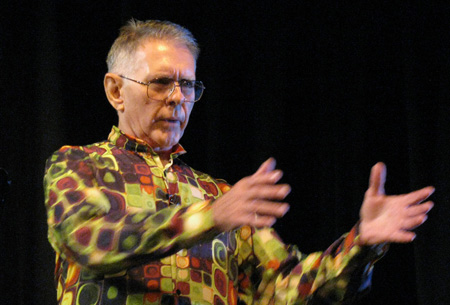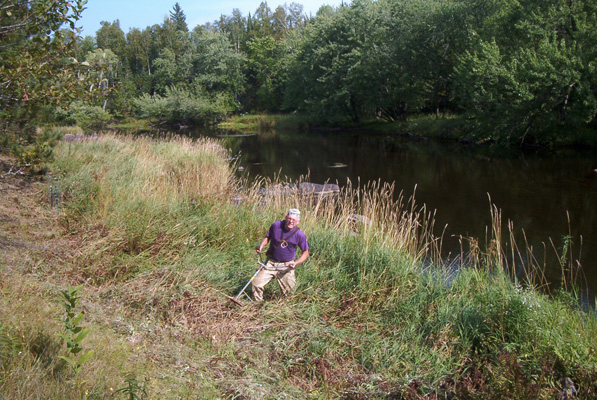(Photo by T.J. Swafford) Biographic Essay
On the surface, stability was a hallmark of Peter’s upbringing. Peter’s Father was employed for forty-five years by the Twin Cities retail clothing firm of Hubert W. White. During that time, Mister Thomas went to work five-and-one-half days a week. For three decades, he served as the firm's Vice-President. On his death bed, he took Peter's hand and stated that he "was proud that, for the last thirty years, he had been able to dictate fashion to the well-dressed man of Minneapolis and Saint Paul."
Peter’s routine included attendance at a parochial elementary school. He attended church every Sunday with his Mother and Father. Peter grew up aspiring to please both his parents and his teachers. Discipline was meted out firmly but sparingly to Peter and neither parent ever uttered a foul word in his presence.
Early on, Peter befriended the children two neighboring families, becoming virtually inseparable from two brothers. This small troupe of seven kids reigned supreme over their secluded city block. Adjacent woodlands and large city park, offered endless opportunities for unstructured adventure. Though reared in these comfortable (many might say “idyllic”) surroundings, Peter, nevertheless, soon came to question his place in the greater scheme of things. His Parents had made him aware from his earliest years of his status as an adopted child. As a consequence of this salient fact, he would often hypothesize on the circumstances of the unknown past that resulted in an arbitrary assignment to his present home. The disquietude engendered from the mystery of his genealogy was further unsettled by his religious upbringing. Peter didn’t know from whence he had come, and the notion of eternal salvation preoccupied him as to where he was ultimately going.
Science now tells us that inclinations of human personality traits are most often inherited. Nonetheless, Peter’s early years seemed to have facilitated a growing propensity towards introspection. As the narrator of Dostoyevsky's disconcerting work Notes From Underground contends, such preoccupations mark the emergence of "excessive consciousness." As in the case of the nineteenth century writer Thomas Carlyle, Peter felt an irresistible pull toward philosophical inquiry:
"The great Mystery of Existence ...glared in upon him, with its terrors, with its splendors...that unspeakable fact, 'Here am I !'....What am I ? What is this unfathomable Thing I live in, which men name Universe ? What is Life; what is Death ? What am I to believe ? What am I to do ?....There was no answer.
Questions such as these have dogged Peter since he was a boy. Not surprisingly, he has often been disappointed in an educational pedagogy designed to mold citizens to serve as economic functionaries. Even at an early age, Peter, like the protagonist in André Gide's novel The Immoralist, felt "the awful boredom and slow corruption of respectable life."
With such sentiments roiling inside him, upon graduation from high school, Peter, age seventeen, enlisted in the U.S. Army. He initially served an eye-opening two years in Germany experiencing much travel and extensive contact with local nationals. With the hope of finding enlightenment from a more dramatic spectrum of life, he extended his term of service and volunteered for duty in Vietnam. It was manifest to him that risks to life and limb were more than outweighed by the tradeoff in understanding to be gained. In the words of Jack London, "The proper function of man is to live, not to exist. I shall not waste my days in trying to prolong them."
Soon after separation from active duty, Peter, who had soured on academics in high school, paradoxically began what would be a lengthy pursuit of higher education. Unfortunately, like the philosopher Nietzsche, he often found himself going hungry at the banquet offered by scholars. Those disciplines which professed a certainty of knowledge did not excite him, while those subjects that seemed to ask the right questions, sadly, provided few definitive answers. Nevertheless, in recognition of the value of public Universities, the waggish dedication to his first book reads:
"In gratitude to the taxpayers of the states of Minnesota, Colorado, New York, and Florida, who supported my years of post secondary education, though who now may conclude that a portion of their beneficence was squandered." Peter was exposed to poetry at an early age. His parents kept an anthology of poetry on the book shelf, a volume he still possesses. He was particularly intrigued by the poetic ability of an uncle, one Albert A. O'Leary, who, at family gatherings, could erupt into verse at the slightest provocation. In latter years, at the culmination of a particularly poignant family reunion, Peter’s Great Uncle, Dale Coates, kept over one hundred family members transfixed by his sonorous recitation of a narrative poem by Robert Service.
Formal training in poetry began in an undergraduate honors seminar in Prosody. His instructor was Professor Arlan Dohrenburg who had trained in the art of oral interpretation, first, at Princeton Theological Seminary, then at Cambridge, England, and finally at Northwestern University. Though Dr. Dohrenburg is now retired from the University of Minnesota, he continues to practice his craft, by daily recording literary selections that are broadcast on a Minnesota radio program for the blind. The two men still converse to discuss the finer points of the poet’s craft.
It slowly evolved that poetry came to fill the void of the unrequited labors of this student of philosophy. The poetry that appealed to Peter was not the modernist form of lyrical self-absorption. He found little interest in that which he refers to as the “dew on the daffodils” appraoch. Rather, as in the case of the ancient Greeks, his was an essential exercise of inquiry, one that carries with it didactic obligations.
As Peter has observed over the span of his life, the more firmly others of his own kind embrace the certitude of their beliefs, the greater is the chance that he has found their conclusions wanting. Peter has thus has often found comfort in sentiments expressed by Dostoyevsky: "Though I have said that I envy the normal man to the point of the bitterest gall, yet, under the conditions in which I see him, I do not want to be one." Such sentiment of the current state of the human condition is in contrast to the blithe optimism of our race and supplies much fertile ground for Peter's persistent uncovering of the amusing foibles of fellow hominids and, yes, also of himself.
With such a background, it should come as no surprise that Peter has often fallen prey to wanderlust. Besides Minnesota and his Army assignments, he has resided in Colorado, Texas, New York and Florida, and has spent much time in Wisconsin. His summer schedule permitting, Peter will find his way to the island he owns in northern Minnesota, a six acre hideaway on which he camps, and loves to landscape.
Brushcutting in 2015, always valuing his all too brief time as caretaker of this magic spot.
In winter he ideally escapes to a small house in northwest Florida. Peter continues to be gainfully employed in order to support his poetry habit. He can occasionally be found working as a farm hand. Though a sardonic critic of the trappings of bourgeois culture, he paradoxically has enjoyed working in wine sales and as a bourbon sommelier.
Pouring wine at "The Tastin Room" in Destin, Florida, 2016
Winemaker Adam Lee (left) and Peter enjoying barrell sampling at |






